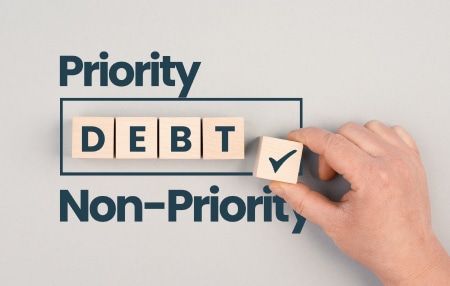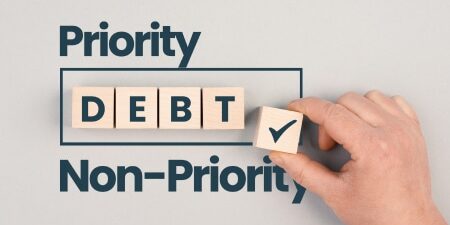
Falling into debt can be very overwhelming, especially if you’re faced with a few different types of debt. For this reason, when it comes to getting yourself out of the financial predicament you find yourself in, understanding the distinction between priority and non-priority debts is crucial.
In this guide, we explain what priority and non-priority debts are, why they matter, and how to handle them efficiently. We also explore how these different types of debt are impacted should you opt to enter into a professional debt management solution such as an Individual Voluntary Arrangement (IVA) or formal Debt Management Plan (DMP).
What are priority debts?
Not all debts are equal in the eyes of the law. For this reason, all debts can be put into two categories – priority debts and non-priority debts. As the name suggests, priority debts are those more important debts that, to put it bluntly, mean you will physically lose something or face serious legal consequences if they go unpaid. That is to say, with these debts, creditors tend to have the right to repossess property, evict you, disconnect utilities, fine you, or even imprison you if you do not pay.
In the UK, examples of priority debts include rent and mortgage payments, utility bills, car insurance payments, income and council tax, maintenance payments, and tv licence payments.
What are non-priority debts?
Again, as the name suggests, a non-priority debt is a debt that, while still important, doesn’t carry the same immediate consequences as priority debts. That is to say, debts that, if go unpaid, don’t lead to the direct loss of an essential possession or service or immediate legal action. However, it’s worth noting that if you fail to pay non-priority debts, your creditors will eventually take legal action and instruct bailiffs to collect money from you.
Examples of non-priority debt include credit cards, unsecured loans and account overdrafts. It can also include money owed to family and friends.
Why do priority debts matter?
Understanding the importance of priority debts is paramount when it comes to both restoring and preserving financial stability. As discussed above, neglecting to service your priority debts can result in a range of serious repercussions. This could include:
- court orders
- eviction
- the use of professional debt collectors and/or bailiffs
- the seizure of assets
As well as the above, failure to pay priority bills like utilities can also lead to disconnection of crucial services such as gas and electricity, adversely affecting your standard of living. Suppliers are prevented from disconnecting your supply in certain circumstances. You should keep your supplier informed of your household and financial situation so that they can work with you to ensure you maintain access to vital services.
By law you can’t be disconnected from your water supply, however failure to come to an arrangement with your supplier may result in money being deducted from your benefits, or further enforcement action such as CCJs or bailiffs.
On top of this, neglecting priority debts will also damage your credit score. This will ultimately exacerbate your financial situation.
How to manage priority debts effectively
There are a number of different approaches to dealing with your debt, including, for example, the snowball and avalanche methods. However, whichever method you choose, focusing on your priority debts first is essential. Below we list our top tips for effectively managing your priority debts:
- Assess your entire financial situation
Start by taking stock of your average income, expenses and outstanding debts to ensure you have a thorough understanding of your financial situation.
- Budgeting and cutting costs
Once you have a grip on your financial situation and have categorised your priority and non-priority debts, try to create a new budget. In doing this, you should attempt to identify areas where you can reduce expenses. By cutting non-essential spending —such as dining out, entertainment, and subscription services—you can free up funds to start paying off your priority debts at a faster rate.
- Communicate with creditors
If you’re struggling to make your priority payments and are in danger of missing a payment all together, contact your creditors and discuss your situation. By doing this and making your creditors aware of the challenges you are facing, you may be able to negotiate repayment plans or alternative arrangements to help you manage your debts.
- Seek professional assistance
If, after exploring the three stages above, you’re still struggling to manage your priority debts effectively, it can be a good idea to find professional financial assistance. This could involve reaching out to a professional debt management company, such as MoneyPlus, who could provide you with guidance and help exploring if you qualify for a debt solution. You could also get in touch with charities and/or government support schemes. For example, you can visit MoneyHelper to get free advice.
Can priority debts be included into a debt solution?
As a rule, priority debts typically cannot be included in standard debt solutions like debt management plans, IVAs or debt consolidation. These debts carry legal consequences for non-payment and therefore must be addressed separately. That being said, while most debt solutions are primarily designed to ease the pressure caused by unsecured non-priority debts, under certain circumstances they can include certain priority debts, such as council tax arrears or utility bills.
Understanding the differences between priority and non-priority debts is essential for effectively managing your financial obligations. To learn more about debt management and how a professional debt management solution can help you, visit MoneyHelper to get free advice or alternatively get in touch with our experts today.

To discover more about how to manage your debt and to receive free debt advice, you can visit www.moneyhelper.org.uk.

